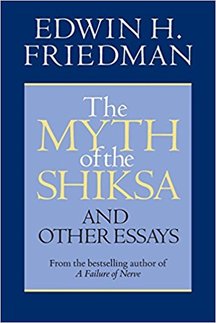For me, Rabbi Friedman was like the Apostle Paul. There were things he wrote that I came to love and appreciate, there were things he wrote that I struggled to understand and things he wrote I think differently about. How true this is of every relationship!
It took time to read through all of Ed's publications looking for an excerpt to share. Each of the books is filled with my handwritten scribbles and notes. The books and my notations represent my early adventures (Ed liked that word) into systems thinking.
Generation to Generation was his most famous publication. There were others. Published in 1985, it became for many clergy their first introduction into systems thinking, family systems and Bowen Family Systems Thinking.
I've chosen his essay, The Myth of the Shiksa, which is published in a book by the same name. The essay was written around 1981, before there were personal computers, which is evident in Ed's use of the phrase "word processor." The essay was important to me at a time when I was examining this cultural phenomena in my family. I found Ed's thinking useful in seeing how the emotional process can hijack cultural identity. Ed used the word "camouflage" to explain how a family's use of cultural identity made the emotional process difficult to see.
I recommend to you the forward of the book written by Ed's daughter Shira Friedman Bogart. I never met Ed in person (although I'd seen him on video). Shira's reflection on her relationship with her father is insightful.
This excerpt below is taken from page 88:
In this essay on the relationship between culture and family process in the formation of Jewish identity, I tried to explain the failure of the emphasis on cultural content to produce a stronger identity. I suggested that such content could be compared to the fuel needed to run a motor, but that we could not make a vehicle go forward by simply filling it with gas if the "transmission" was in neutral, let alone reverse. When the emotional system is ignored and the focus remains on cultural content, communication has the effect of typing a message on a word processor when the power has been turned off. When it comes to changing families, since all families are supplied by their culture with an infinite variety of rationalizations for their behavior, a focus on values and ideological positions is often just another from of displacement. To offer reasonable alternatives to such positions, therefore, is once again only to conspire in the family's denial of its emotional process.
It has been my experience in working with families of all backgrounds that rather than values or reasons, power is the most forceful agent of change. This is not the power of conquest and domination but rather the strength to get enough distance from the anxiety maelstrom whirling around us to think out our own values, whether or not they coincide with values from our own background, to define them clearly, and then to have the strength to hold that position against the efforts of others to change us back. In other words, the most powerful agent of change comes more out of a focus on our own values than on trying to define the values of others.
Therefore the widespread but erroneous belief that expressed values are the cause of family members' positions and that, therefore, change in a given family member's functioning can be brought about by appealing to or changing those values, simply escalates anxiety and resistance on both sides. For it encourages a process wherein each side is perpetually trying to define, convince, change, and, therefore, convert the other.
Subscribe to receive the newest blog in your inbox every Monday morning.

 RSS Feed
RSS Feed